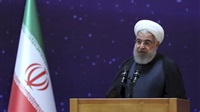Iran rejects French call for wider talks beyond nuclear deal

Iran rejected French calls for wider international
talks over its nuclear and military ambitions, saying on Friday it would only
discuss it existing 2015 atomic pact with world powers, state TV reported.
French President Emmanuel Macron had said a day
earlier that Paris and Washington both wanted to stop Tehran getting nuclear
arms and new talks should focus on curbing its ballistic missiles program and
on other issues.
But Iran’s foreign ministry said it would not hold
any discussions beyond the 2015 pact which U.S. President Donald Trump
abandoned last year as he pressed for tougher restrictions.
“Under this circumstances, talking about issues
beyond the deal ... will lead to further mistrust among the remaining
signatories of the deal,” foreign ministry spokesman Abbas Mousavi said in a
statement.
The United States pulled out of the 2015 agreement -
under which Tehran agreed to curb its nuclear work in exchange for sanctions
relief- saying it did was not permanent and did not do enough to control Iran’s
missiles and regional influence.
France and other European signatories to the deal
have said they wanted to save it, but many of their companies have canceled
deals with Tehran, under financial pressure from the United States.
U.S. will not accept more Turkish F-35 pilots over
Russia defenses
The United States has decided to stop accepting any
additional Turkish pilots who planned to come to the United States to train on
F-35 fighter jets, U.S. officials say, in a clear sign of the escalating
dispute over Ankara’s plans to purchase Russian air defenses.
The two NATO allies have sparred publicly for months
over Turkey’s order for Russia’s S-400 air defense system, which Washington
says poses a threat to the Lockheed Martin Corp F-35 stealthy fighters, which
Turkey also plans to buy.
The United States says Turkey cannot have both, but
has avoided taking steps until now to curtail or halt planned training of
Turkish pilots in the program, a reprisal that could be seen as an
embarrassment in Turkey.
The two U.S. officials, who spoke to Reuters this
week on condition of anonymity, left open the possibility the decision could be
reversed, perhaps if Turkey altered its plans. They said the decision so far
only applied to upcoming rounds of Turkish pilots and maintenance crews who
would have normally come to the United States.
There has not yet been a formal decision to halt the
training of the Turkish pilots and maintenance crews now at Luke Air Force Base
in Arizona, the sources said. Still, Reuters reported last week that the step
was being seriously considered.
Four Turkish pilots are currently training at Luke.
Two additional Turkish pilots are at the U.S. base working as instructors.
Beyond those six Turkish officers, there are an additional 20 Turkish aircraft
maintainers at the base undergoing training as well, the U.S. military says.
Turkey has expressed an interest in buying 100 of
the fighters, which would have a total value of $9 billion at current prices.
If Turkey were removed from the F-35 program, it
would be one of the most significant ruptures in recent history in the
relationship between the two allies, experts said.
But strains in ties between Washington and Ankara
already extend beyond the F-35 to include conflicting strategy in Syria, Iran
sanctions and the detention of U.S. consular staff in Turkey.
The disclosure of the decision on the pilots follows
signs that Turkey is moving ahead with the S-400 purchase. Defense Minister
Hulusi Akar said on May 22 that Turkish military personnel were receiving
training in Russia to use the S-400, and that Russian personnel may come to
Turkey.
President Tayyip Erdogan said on Tuesday it was “out
of the question” for Turkey to back away from its deal with Moscow.
Kathryn Wheelbarger, one of the Pentagon’s most
senior policy officials, said last week that Turkey’s completion of the
transaction with Russia would be “devastating,” dealing heavy blows to the F-35
program and to Turkish interoperability within the NATO alliance.
“The S-400 is a Russian system designed to shoot
down an aircraft like the F-35,” said Wheelbarger, an acting assistant
secretary of defense. “And it is inconceivable to imagine Russia not taking
advantage of that (intelligence) collection opportunity.”
The Pentagon declined comment on whether it would
accept new Turkish pilots. But it has stressed discussions are taking place
with Ankara on potentially selling Turkey Patriot missile defenses, which are
made by Raytheon Co.
Erdogan said on Tuesday, however, that the United
States had not “given us an offer as good as the S-400s.”









